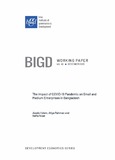| dc.contributor.author | Islam, Asadul | |
| dc.contributor.author | Rahman, Atiya | |
| dc.contributor.author | Nisat, Rafia | |
| dc.coverage.spatial | Bangladesh | en |
| dc.date.accessioned | 2022-06-27T10:57:57Z | |
| dc.date.available | 2022-06-27T10:57:57Z | |
| dc.date.issued | 2022-03-31 | |
| dc.identifier.citation | Islam, A.; Rahman, A. and Nisat, R. (2022) 'The Impact of COVID-19 Pandemic on Small and Medium Enterprises in Bangladesh', BIGD Working Paper 62, Dhaka: BRAC University | en |
| dc.identifier.uri | https://opendocs.ids.ac.uk/opendocs/handle/20.500.12413/17500 | |
| dc.description.abstract | Like other economic players, the
novel pandemic severely hit small
businesses—the larger source of
growth and employment but also the
most vulnerable sector—by disrupting
national and international business
networks, supply chain, and demand.
To understand the evolving state of
small enterprises during pre, par,
and post-lockdown periods, BIGD in
collaboration with Monash University,
Australia conducted a survey on small
enterprises, mostly light-engineering
firms, and young workers across 18
districts in Bangladesh. The study
finds that lockdown measures caused
the majority of small enterprises shut
down, and during the early period
of relaxing the lockdown, one-third
of the enterprises were operating at
limited capacity. Demand drop and
the burden of fixed costs to run the
businesses were the prominent reasons
behind the drastic fall in profit. As a
result, workers were losing jobs and
the gender gap was widening, because female labour-intensive work (i.e.
beauty parlour, tailoring) was affected
harder. Other findings of concern
include the emerging vulnerabilities for
the enterprises with lower endowment
and poor access to government
stimulus packages, and other financial
support. The study emphasises on
the importance of concrete targeting
criteria and support delivery platforms
to assist more vulnerable enterprises.
Finally, it highlights that the enterprises
that received BRAC’s intensive training
on occupational health and safety
(OHS), along with business training
and financial linkages, made double
profit compared to their counterparts.
However, the absolute amount of profit
was substantially lower for both groups,
compared to their pre-COVID profit,
indicating the importance of scaling up
such intensive training to create more
resilient enterprises in such crises. | en |
| dc.language.iso | en | en |
| dc.publisher | BRAC University | en |
| dc.relation.ispartofseries | BIGD Working Paper;62 | |
| dc.rights.uri | http://www.brac.net/terms-of-use/ | en |
| dc.subject | Health | en |
| dc.subject | Work and Labour | en |
| dc.title | The Impact of COVID-19 Pandemic on Small and Medium Enterprises in Bangladesh | en |
| dc.type | Other | en |
| dc.rights.holder | BRAC University | en |
| dc.identifier.externaluri | https://bigd.bracu.ac.bd/wp-content/uploads/2021/03/WP_Impact-of-COVID-19-Pandemic-on-Small-and-Medium-Enterprises-in-Bangladesh.pdf | en |
| rioxxterms.funder | Department for International Development, UK Government | en |
| rioxxterms.identifier.project | Covid Collective | en |
| rioxxterms.version | VoR | en |
| rioxxterms.funder.project | 77b8f9cf-5d96-4012-a396-c9b3f6712d70 | en |

